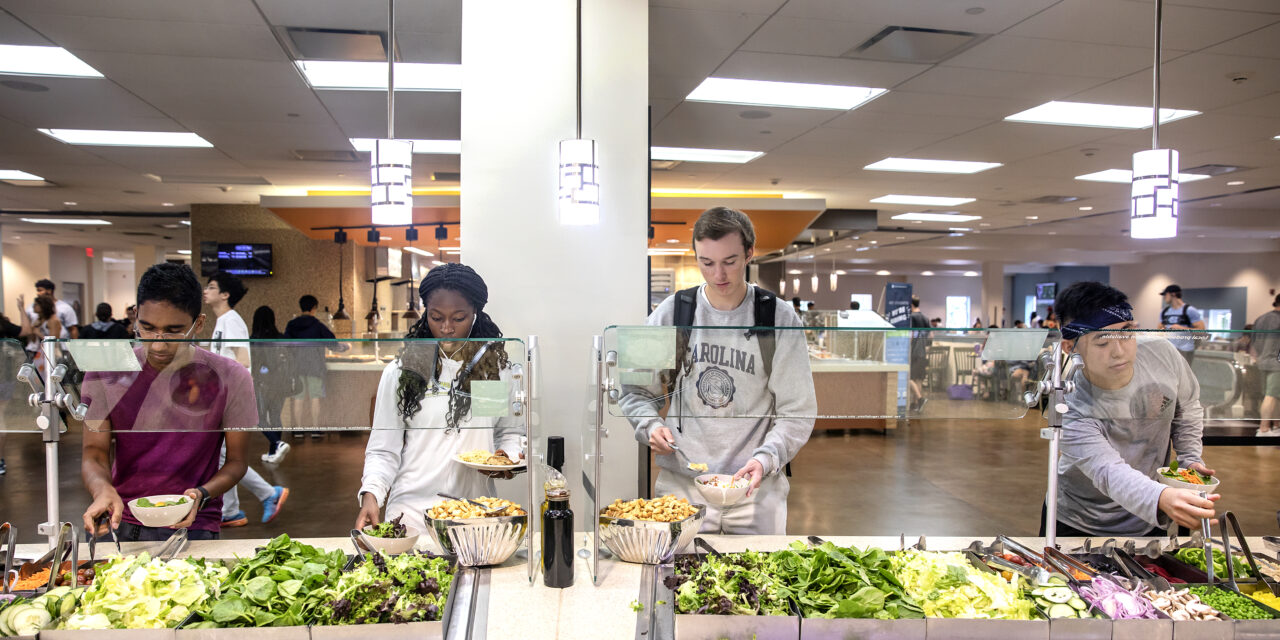While consistent access to enough and healthy food leads to better overall classroom performances and higher GPAs, food insecurity impacts college campuses nationwide… and Carolina is no exception. According to a university survey, about a third of UNC students struggled with food security last fall, but a proposed meal swipe donation plan could help address the issue on UNC’s campus.
Presented to the Board of Trustees at a January 22 meeting, the plan is an effort between Student Affairs and Student Government, and it would allow students with meal swipes to spare to donate them to a student who requests one, UNC Dean of Students Desirée Rieckenberg explained.
“And oftentimes it’s the students who have [a meal plan] at maybe a higher level, an abundance [of swipes] if you will, who are looking at the end of the semester, or sometimes end of the year, and saying I’m not going to use any of these,” she said. “And then how do we be able to take a resource that students have already paid for and have a commitment to being able to give back to their communities.”
According to the survey, more than half of students with meal plans had swipes left over at the end of the semester, and about a third of students reported they do not do anything with their remaining swipes. Rieckenberg acknowledged how parents and families often help pay for a student’s meal plan, but explained how the program to share extra swipes has received positive support from many parents.
UNC Student Body President Jaleah Taylor said peer universities like NC State and UNC Charlotte have already developed similar programs, and 96 percent of surveyed Carolina students supported the idea of donating their extra swipes to those in need. About 40 percent of those surveyed stated they would be interested in being a recipient.
While UNC has existing food insecurity initiatives, like the Carolina Pantry Network and the Edible Campus, Executive Manager of the Office of the Student Body President Ella Howie said they need more promotion and support. And she said the addition of a meal swipe program would help address that prevalent gap between students with excess swipes and those who need more.
For students who do run out of swipes, the surveyed students said they typically rely on peanut butter and jelly sandwiches, eating once a day to maximize remaining funds, asking classmates for swipes, or buying microwavable meals at the supermarket. However, Howie said those options are not always healthy or feasible.
“I personally, freshman year, had a hard time with food insecurity because I didn’t have my car on campus,” Howie said. “And also the walkability to a grocery store is a little bit hard with Target being one of the only grocery stores available.”
UNC currently offers a variety of meal plans in an effort to accommodate a student’s schedule and needs, but Rieckenberg said some students might opt for a smaller plan or no plan at all because it is what they can afford. She also said dietary restrictions or other financial obligations can be another deciding factor for them. For example, while student aid budgets include enough funds for an unlimited meal plan, students might choose to spend that aid differently.
Trustee Marty Kotis suggested having a way for the larger community to donate to the program, like paying for swipes, so it is not merely students supporting other students. Taylor said she saw evidence of that kind of support during November’s Pantry Bowl event.
“A lot of those people that were donating were not even UNC students or UNC [alumni], but they were actually my family members who didn’t even go to Carolina,” Taylor said. “So there’s a lot of people that really want to buy into supporting students especially when it comes to food insecurity on campus.”
The SBP added how the new Carolina Financial Well-Being Center will also be a resource for students who might run out of swipes or money for food due to a lack of financial literacy, like not knowing how to budget.
Rieckenberg said while students are coming from a variety of backgrounds and experiences, they are all superiorly qualified to be at Carolina. But you also have to be well to do well, she explained.
“And so part of being well is knowing that you have a healthy meal in front of you, and you have a roof over your head, and that your basic needs are taken care of,” she said.
To view the full Board of Trustees meeting, click here.
Featured image via Johnny Andrews/UNC-Chapel Hill
Chapelboro.com does not charge subscription fees, and you can directly support our efforts in local journalism here. Want more of what you see on Chapelboro? Let us bring free local news and community information to you by signing up for our newsletter.











